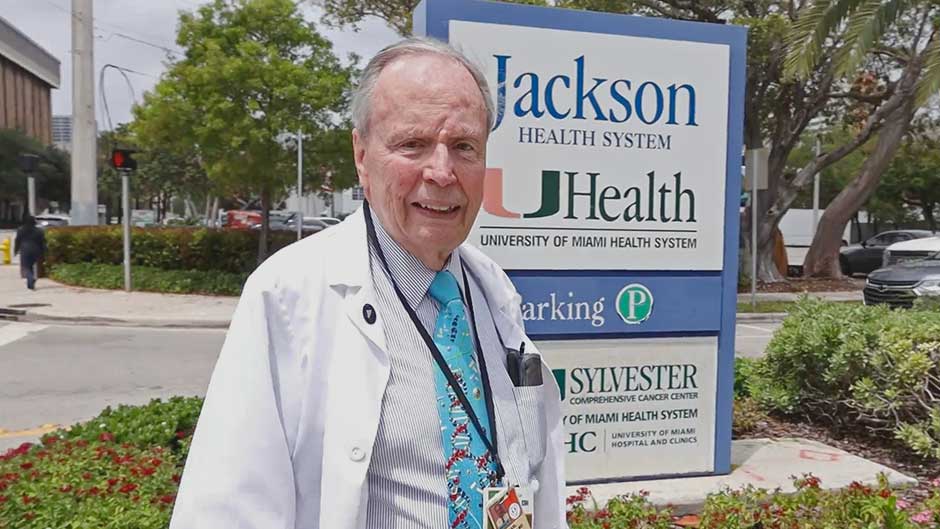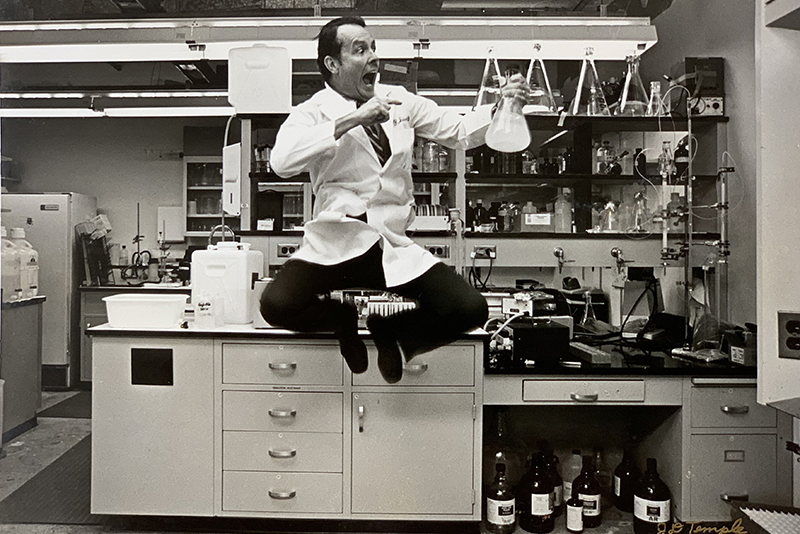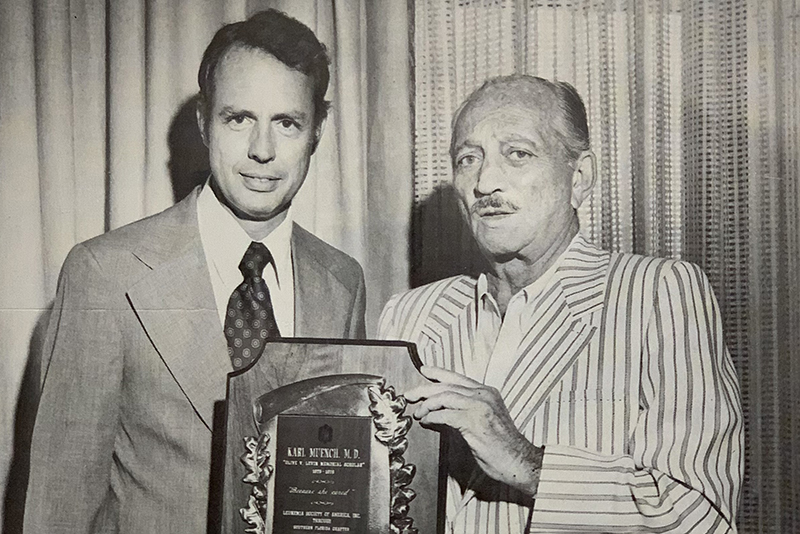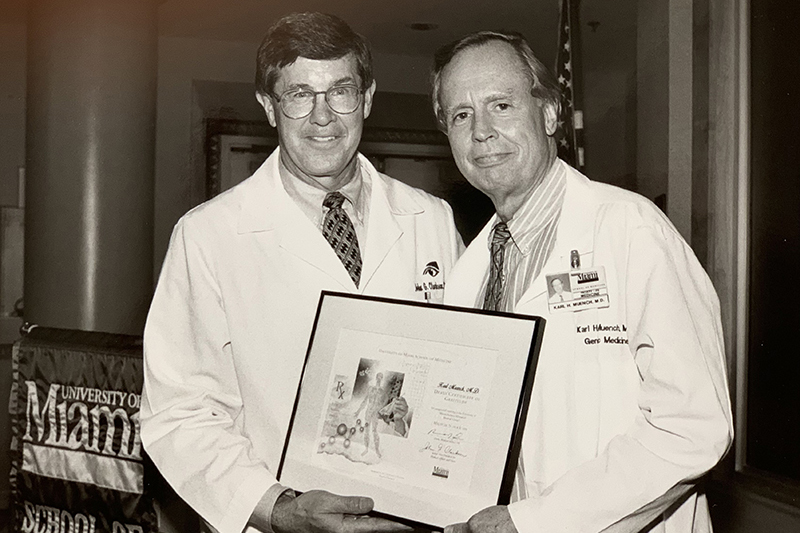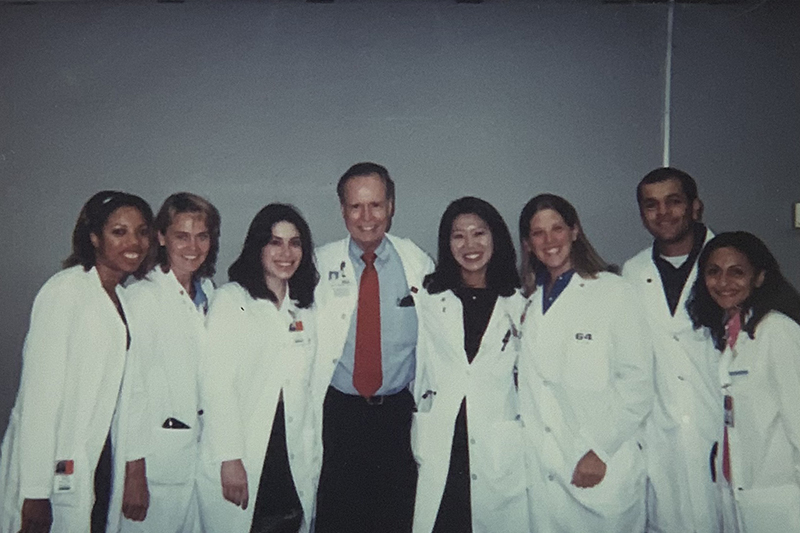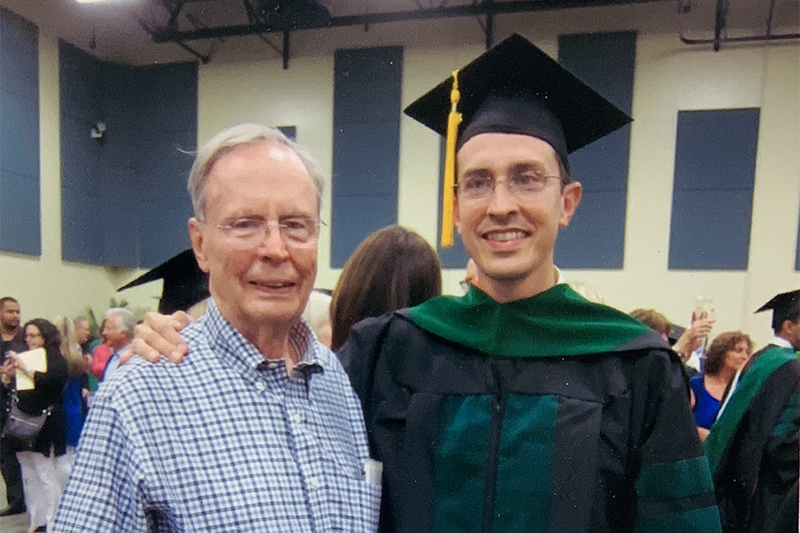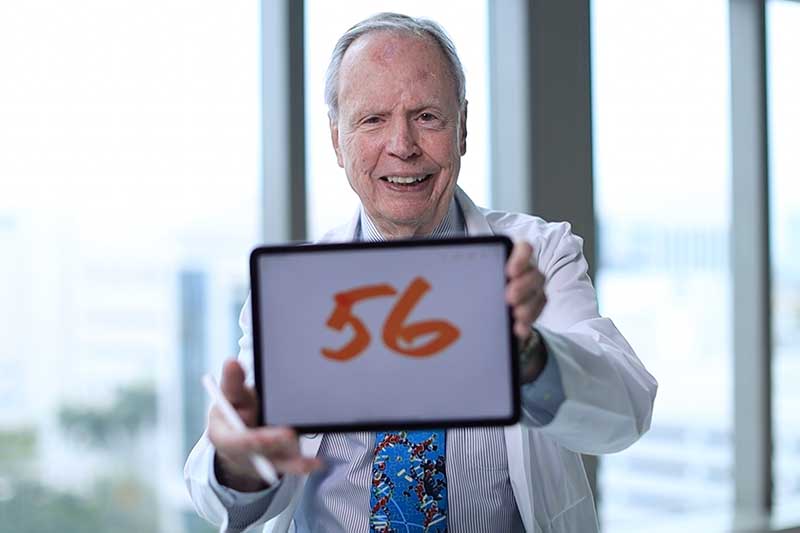More than fifty years ago Dr. Karl Muench, professor of medicine at the Miller School of Medicine, was asked to teach his first lecture on human genetics. “I went out and bought a human genetics textbook,” recalled the 87-year-old, who initially taught biochemistry to first-year medical students. “I read it cover to cover, boiled it down to a one-hour lecture, and gave it. It was a big success.” The following year, he was asked to prepare a two-hour lecture and it eventually became a 40-hour course at the beginning of the curriculum. “On day one of medical school, the students had my required course,” he added. “I just loved it, and they did too.”
Muench noted that his genetics course was arguably the most popular in the curriculum, which he attributes to a number of things, among them, his ability to make genetics relatable. “I thought of all the things students love—sports, history, art, music, sex—and I was able to connect all those things to genetics,” he explained. Whether it was linking genetics to music—Sergei Rachmaninoff and Frederic Chopin dealt with genetic disorders—or sports—baseball player Lou Gehrig suffered from ALS, he found a way to tie a variety of subjects to genetics in a memorable way. “Decades later, students tell me how they have never forgotten things from my course,” he added. “Genetics is not just a dry mathematical discipline to memorize, but an integral part of their lives.”
Recruited in 1965 by his mentor Dr. William J. Harrington—whom he had met at Washington University Medical School in St. Louis—with a group of other former students and fellows, Muench arrived from California to become part of what he called an “extraordinary group with an extraordinary leader.” Coconut Grove, where he lived, was “a little artist colony with lots of trees and no hi-rise buildings.” Muench remembers that the University’s department of medicine was housed in a small cottage in what is now a parking lot and the medical school lectures were held in the worker’s quarters at the Biltmore Hotel in Coral Gables. “None of these big buildings were here,” he noted.
Over the past five decades, Muench has had the opportunity to make an impact not only in the classroom, but also in the Jackson Memorial Hospital emergency department where he served as an attending physician and was on-call for Dr. Harrington if “he had a desperate situation and needed to plug someone in.” Muench served as the director of the Miller School of Medicine M.D./Ph.D. program—which was a dream come true for Dr. Harrington and the late Dr. William J. Whelan, an internationally famous biochemist and former chairman of the Department of Biochemistry. Additionally, he served as director of the sickle cell center and the center for Gaucher disease. He described both as being “fascinating, interesting, and consuming while being connected to each other and dependent on a background in basic science integrated into clinical medicine.”
According to Muench, he differed from his colleagues because he never did a residency. Much of his clinical training was learned on the job, but his expertise lay in his knowledge of biochemistry and DNA, the focus of a four-year, post-MD fellowship at Stanford University. “One of my biggest and constant thoughts is how fortunate I have been to have had the teachers I have had beginning in grade school,” he declared. Growing up in Evanston, Illinois, Muench graduated as the high school valedictorian and received a full scholarship to Princeton University to complete his undergraduate studies. A full scholarship at Washington University School of Medicine in St. Louis followed, where he was surrounded by then and future Nobel laureates. “I think back in those days, as a teenager, I took those things for granted,” he noted, pointing out that he was incredibly lucky to have had such a fabulous education, surrounded by the greatest teachers in the world, and the ability to graduate without student debt.
Muench feels particularly indebted to his chief and mentor, the late Dr. Harrington, who made him feel like part of the family. Today, his son Thomas J. Harrington, an assistant professor of hematology at Sylvester Comprehensive Cancer Center, is one of Muench’s physicians. Both Tom, and his late brother Bill, were Muench’s students at the University of Miami. But, Muench remembers when, as a toddler, Tom would visit his lab in St. Louis. “Tom would be playing on the floor, and now he’s my doctor,” he said laughing.
A father of five and grandfather of 12, Muench and his wife, Anyltha “Any” Muench, have enjoyed their life together in Miami. Among his favorite pastimes, he loved spending time on the water and scuba diving on the weekends. “My time at the UHealth system has been the core interest, activity, and passion of my life,” he said. For him, the Miller School of Medicine serves as a resource to the city of Miami. “I can't imagine Miami without this medical school,” he stated.
Muench’s advice to his students has always been the same—identify what you can be passionate about in your profession and study and follow it. For him, his time in the classroom teaching genetics was his passion, and he is grateful to have had the opportunity to do it. “If you were a first-year student in my course and you made a genetic diagnosis that had been missed by the faculty and residents, you got into the genetics hall of fame,” he explained. “We had a lot of fun in the course.”
While much has changed over the years, Muench continues adapting, like shifting to telemedicine during the past year. “At first I was skeptical,” he admits. “I told my wife I have to relate to people in person. Now I find I can do that on telemedicine. The patients like it, and I like it.”
Karl Muench was among the colleagues honored during the University’s Long Service Award Ceremony held virtually on April 27, 2021, which recognized those who have served the University for 25 milestone years or more as of 2020. Learn more about the event.
